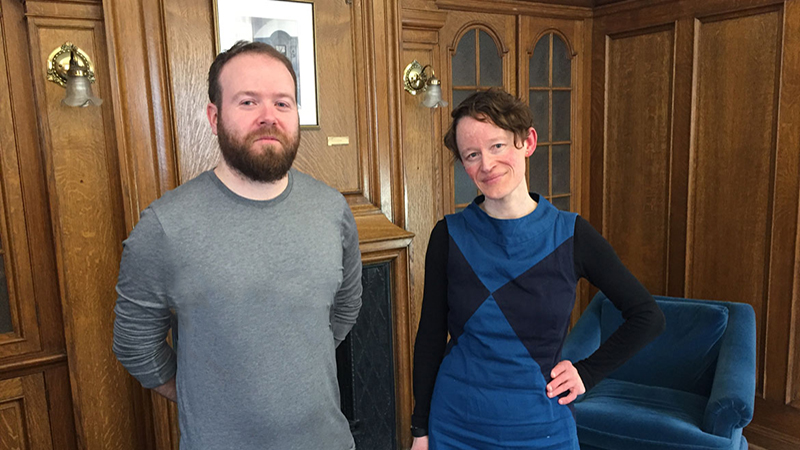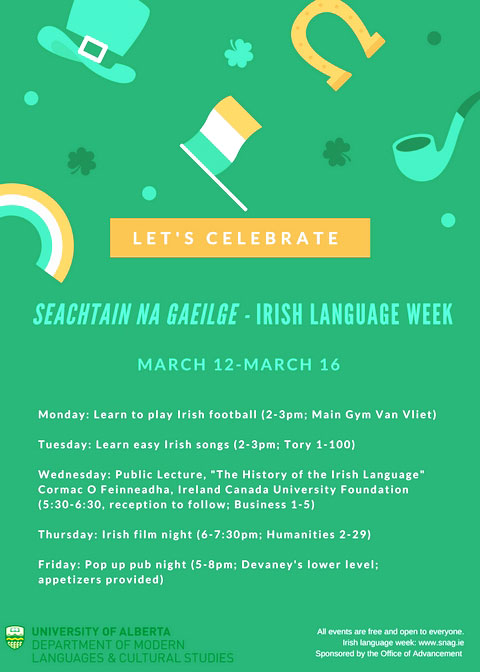
Cormac Ó Feinneadha and MLCS Chair Carrie Smith
Visiting Irish language scholar Cormac Ó Feinneadha says that Irish Gaelic reflects the Irish predilection for storytelling. He cites the phrase for ladybird - Bó beag Dé - which translates as "God's little cow," as an example. "Obviously, it looks like a cow with spots," he laughs, adding that plain, unembellished descriptions do not exist in his native tongue. "There's always a story behind the phrase. Irish is beautiful in that way."
Ó Feinneadha will be thefeatured speaker at Modern Language and Cultural Studies' Seachtain Na Gaelige/Irish Language Week, March 12-16. Seachtain Na Gaelige has been celebrated in Ireland since the early 1900s and has since spread throughout the world, landing at the University of Alberta for the first time this year (a first in Western Canada), which also happens to be the Year of the Irish Language in Ireland.
Ó Feinneadha's lecture on Wednesday, March 14 will be about the history of the Irish language, focusing on colonialism and the influence of the Irish language on Irish identity and how it resonates across the globe.
"Irish Language Week is an opportunity for people to get an introduction to the language, the culture, the sport, and of course, the lecture," says MLCS Chair, Carrie Smith. It's a signature event, drawing attention to the introduction of accredited Irish language courses this fall.
Working with theIreland Canada University Foundation to set up this three-year pilot project, Smith is excited about the opportunities it brings, including the arrival of Ó Feinneadha, who has been at the University of Alberta since the beginning of the semester. Acting as a kind of ambassador for the program, Ó Feinneadha has been helping to lead Irish Language Week events as well as teaching a non-registered trial run of the language "for people to get their feet wet in a little bit of Irish" before its formal launch in September.
As a language that is spoken by very few - there are approximately 72,000 Irish-speakers in a country of 6.5 million - it may seem like an unusual choice, but Smith-Prei sees parallels in the issues that permeate the discourse around minority languages in both Ireland and Canada.
"I think it really fits with some of the languages we teach here, lesser taught languages still spoken in certain areas," she says. "I'm not Irish, but I had been in Dublin before and had experienced first-hand the ways in which two languages co-exist, sometimes not well, sometimes better, in a country that is primarily Anglophone. We see that in Canada. Irish is a very different language than French, of course, but some of the same issues arise. And, in addition, there are questions around Indigenous and lesser taught languages that come up when we're speaking about Irish that also resonate here in Canada."
Ó Feinneadha agrees. "I'm from Dublin, not a very Irish language stronghold," he says. "I was one of the rare people raised with Irish as my first language, and so when I teach my class, I talk about the importance of diversity. I come from a place where no one else spoke the language I spoke. It's important to emphasize that [they're] contributing to something that could die out in 50 years - not just the Irish language, but other minority languages."
Smith believes that learning other languages is a way to bridge cultural divides and build empathy. "I feel it much more urgently today," she says. "When students in our department or across the university learn languages, they see those languages alive around them. We send our students off to become ambassadors, not only of the language they were born and raised with, but the one they're learning. Communication changes the shape of world we live in, and by having just a little bit of another language, not only does it open up doors, allowing students to rapidly develop that empathy, they develop that empathy right here, because they see it here. And that matters."
Introductory Irish courses will begin in the fall, with Irish I offered in the first semester and Irish II in the second. There will also be an open topics cultural studies course that is structured around the expertise of the instructor, who will be appointed each year by the Ireland Canada University Foundation. The program will offer a three to four week study abroad opportunity for students who wish to deepen their knowledge of the language as it is lived on the ground, in Ireland, primarily along the western coast where Irish remains the dominant language.
Ó Feinneadha will return to Ireland at the end of this semester, relinquishing his membership on the departmental hockey team (and his newly acquired skates) and waxing poetic about the university's embrace of other languages - and Edmonton's weather. "It takes some getting used to," he laughs. "Actually, the other day I was like a strange man walking through campus, and I just had to stop and admire the snow falling. I know if you live here all the time so it's not a novelty, but for me, it's pretty beautiful."
Please click here to register for Cormac Ó Feinneadha's public lecture on the History of the Irish Language, Wednesday, March 14, from 5:30 to 6:30 p.m., Business 1-5.
For more information about the Irish language courses, please contact theDepartment of Modern Languages and Cultural Studies.
